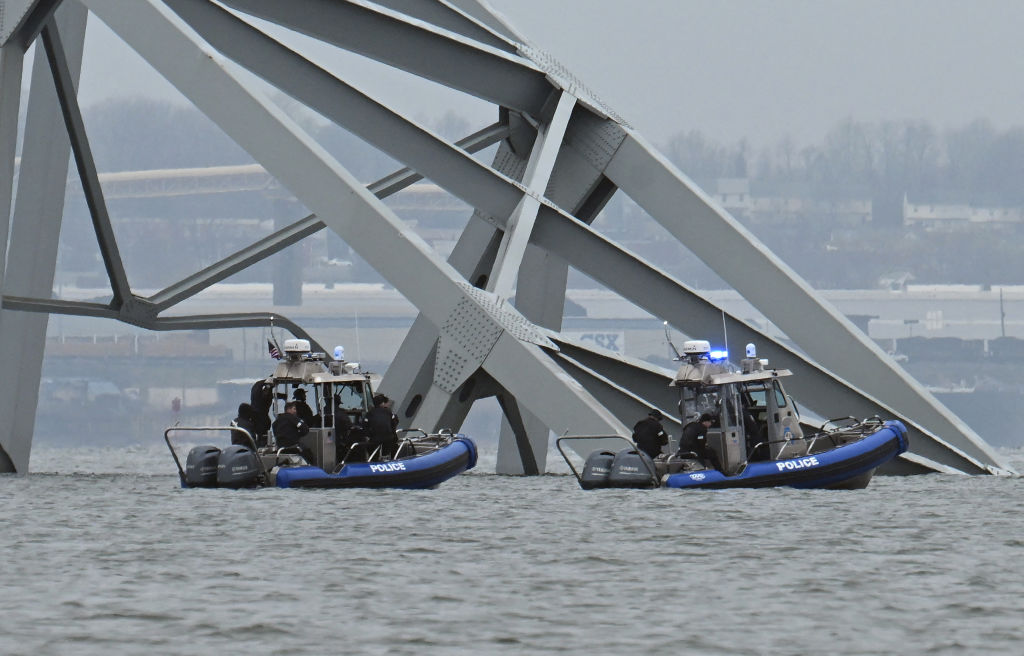
National Transportation Safety Board officials have boarded the MV Dali and divers continue to seek victims of the collapse.
The post Baltimore Ship ‘Black Box’ Data Recorder Taken by Investigators as Search for Missing Continues appeared first on Breitbart.
The investigation and recovery after the catastrophic bridge strike over the Patapsco River continues, with National Transportation Safety Board officials having boarded the MV Dali and professionals continuing to seek victims of the collapse.
National Transportation Safety Board (NTSB) officials have now removed the MV Dali’s data recorder — like the famous ‘black boxes’ of commercial aircraft — which upon evaluation may contain further information about the cause of the loss of propulsion that seems to have contributed to Tuesday’s disaster.
Among the more mundane reasons for the “lost propulsion” that would have left the ship not able to steer its own way and vulnerable to currents and changing dynamic forces in the water as it crossed dredged channels are dirty or bad fuel, insufficient maintenance, or freak mechanical failure. Nevertheless, it was stated the ship was up to date with its inspections and certifications at the time of the accident.
The unprecedented quality of the information available to the public about the disaster in the first hours has also seen some consideration in the public sphere about the possibility of a terrorist attack including a cyber attack on the ship. Nevertheless, the FBI and Baltimore Police have said they have seen no evidence of terrorist activity in their preliminary investigations.

Police recovery crews work near the collapsed Francis Scott Key Bridge after it was struck by the container ship Dali in Baltimore, Maryland, on March 27, 2024. Authorities in Baltimore were set to focus on expanding recovery efforts on March 27 after the cargo ship slammed into the bridge, causing it to collapse and leaving six people presumed dead. All six were members of a construction crew repairing potholes on the bridge when the structure fell into the Patapsco River at around 1:30 am (0530 GMT) on March 26. (Photo by Jim WATSON / AFP) (Photo by JIM WATSON/AFP via Getty Images)
The search for survivors was suspended on Tuesday night, with rescuers citing dangerous conditions for divers including frigid waters and debris from the disaster. That work resumed early Wednesday morning, although with over 24 hours now having passed the focus has shifted from finding survivors to finding victims, with those yet to be recovered now listed as presumed dead.
Per local reports, all of those eight who fell into the water from the construction crew repairing potholes on the Scott Key Bridge were central or southern American origin workers. While two have been recovered alive, including one who didn’t even need hospital treatment, at least two victims have been named. Miguel Luna from El Salvador, a father of three. was declared among the dead overnight and Maynor Suazo Sandoval, a Honduran, was also named on Wednesday morning.
As well as divers supported by small boats, it is stated the use of sonar, underwater drones, and helicopters are also contributing to these efforts.
While the initial horror at the sheer scale of Tuesday’s disaster and the sorrow for the families of those lost will persist, inevitably attention will also turn to the long term economic impacts of the Port of Baltimore being blocked. As stated by Breitbart economics editor John Carney:
The economic consequences of the calamity in Baltimore are likely to be substantial… The port is completely shut down in the wake of the collision of the Dali with the Key bridge and the near-total collapse of the bridge. It is likely to take weeks or even months to get the port back in working order given the position of the bridge. Perhaps portions the channel can be cleared more quickly but that is unclear at this time.
… Some of the cargo shipments will be able to be absorbed by other ports on the East Coast, but they will not have capacity to take all of the cargo that would have gone through Baltimore. As we saw during the pandemic, even small expected increases in shipping volumes can result in the equivalent of traffic jams at ports… Economists call this a “supply shock,” and it is likely to lead to a resurgence of goods inflation and possibly temporary shortages of some goods





